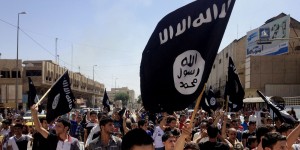
Islamic State bigger threat than Al Qaeda, FBI chief says
The Islamic State terror group’s effort to inspire troubled Americans to extremism is a greater threat to the U.S. than an external attack from Al Qaeda, the FBI director said Wednesday.
FBI Director James Comey told an audience at the Aspen Security Forum that the group, commonly known as ISIS, has influenced a significant number of Americans through a year-long campaign on social media urging Muslims who can’t travel to the Middle East to “kill where you are.”
Twitter handles affiliated with the group have more than 21,000 English-language followers worldwide, Comey said, adding that thousands of those could be U.S. residents.
The FBI has arrested a significant number of people over the last handful of weeks who had been radicalized, Comey said. He also repeated his previous disclosure, without elaborating, that several people were arrested who were planning attacks related to the July Fourth holiday.
Comey said it was too soon to say how Muhammad Youssef Abdulazeez, the Chattanooga gunman who killed five U.S. troops last week, became radicalized.
Abdulazeez’s relatives have said he had a history of drug use and depression. Comey noted that “the people the Islamic State is trying to reach are people that Al Qaeda would never use as an operative, because they are often unstable, troubled drug users.”
Asked if the threat from the Islamic State group had eclipsed that of Al Qaeda, the rival organization that attacked the U.S. on September 11, 2001, Comey said, “Yes.”
The U.S. has tracked dozens of Americans, ranging in age from 18 to 62, who have traveled to Syria or Iraq to fight with ISIS, he said.
“I worry very much about what I can’t see,” Comey added, because he said ISIS recruiters use encrypted communication software to avoid U.S. eavesdropping.
Comey’s remarks Wednesday signal a deepening concern among U.S. officials about the impact of ISIS efforts to inspire terrorist violence. As recently as September, senior U.S. intelligence officials were downplaying the group’s capacity to attack the U.S. Matt Olsen, then the head of the National Counter Terrorism Center, told Congress last year that the U.S. had “no credible information that ISIL is planning to attack the United States.”
Intelligence officials last year were saying they worry about a mass casualty attack against a U.S. airliner by Al Qaeda’s Yemen affiliate or by the Khorasan Group, a cadre of Al Qaeda operatives in Syria.
But Comey said Wednesday the threat from the Khorasan Group has been “significantly diminished” by U.S. military strikes.
The Pentagon on Tuesday announced that it had killed the Khorasan Group’s leader, Muhsin al-Fadhli, in a July 8 airstrike in Syria.
The Associated Press contributed to this report.




